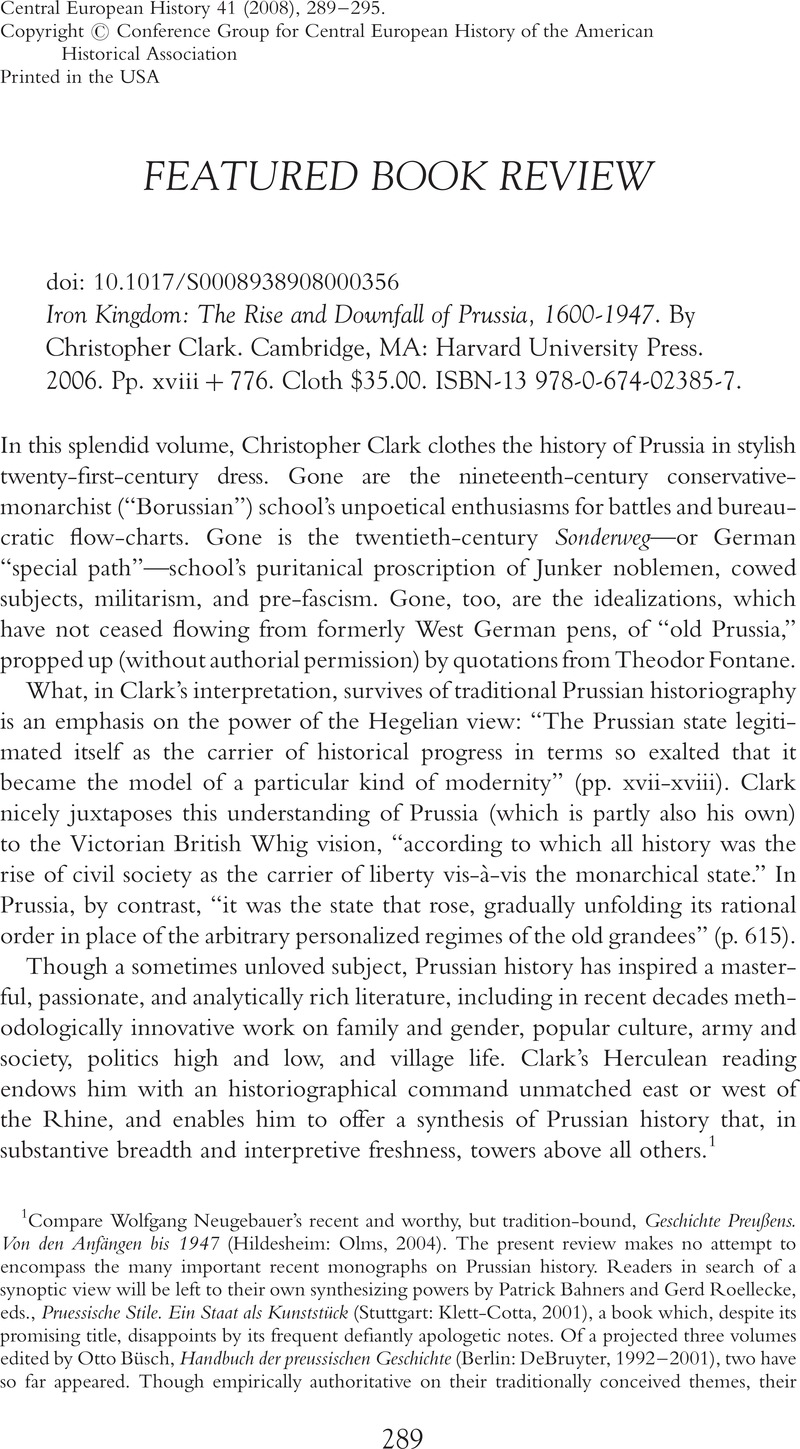No CrossRef data available.
Article contents
Iron Kingdom: The Rise and Downfall of Prussia, 1600-1947. By Christopher Clark. Cambridge, MA: Harvard University Press. 2006. Pp. xviii+776. Cloth $35.00. ISBN-13 978-0-674-02385-7.
Published online by Cambridge University Press: 02 May 2008
Abstract

- Type
- Featured Book Review
- Information
- Copyright
- Copyright © Conference Group for Central European History of the American Historical Association 2008
References
1 Compare Wolfgang Neugebauer's recent and worthy, but tradition-bound, Geschichte Preußens. Von den Anfängen bis 1947 (Hildesheim: Olms, 2004). The present review makes no attempt to encompass the many important recent monographs on Prussian history. Readers in search of a synoptic view will be left to their own synthesizing powers by Patrick Bahners and Gerd Roellecke, eds., Pruessische Stile. Ein Staat als Kunststück (Stuttgart: Klett-Cotta, 2001), a book which, despite its promising title, disappoints by its frequent defiantly apologetic notes. Of a projected three volumes edited by Otto Büsch, Handbuch der preussischen Geschichte (Berlin: DeBruyter, 1992–2001), two have so far appeared. Though empirically authoritative on their traditionally conceived themes, their chapters do not yield a newly conceived overarching interpretation. The same may be said of the many valuable essays comprising the two volumes edited by Philip G. Dwyer, The Rise of Prussia 1700–1830 and Modern Prussian History 1830–1947 (Harlow, UK: Longman, 2000–2001).
2 Philip S. Gorski, The Disciplinary Revolution: Calvinism and the Rise of the State in Early Modern Europe (Chicago: University of Chicago Press, 2003).
3 Cf. Benjamin Marschke, Absolutely Pietist: Patronage, Factionalism, and State-Building in the Early Eighteenth-Century Prussian Army Chaplaincy (Tübingen: Niemeyer, 2005).
4 Wolfgang Mommsen, War der Kaiser an allem schuld? Wilhelm II. und die preussisch-deutschen Machteliten (Berlin: Propyläen, 2002). Hans-Peter Ullmann, by contrast, is not much interested, in his Das deutsche Kaiserreich, 1871–1918 (Frankfurt am Main: Suhrkamp, 1995), in defining Prussia's structural role in the late Empire. Hans-Ulrich Wehler, who made of a Prussian-built Sonderweg the mighty Autobahn of German history, has continued to refine his powerful arguments. See William W. Hagen, “Master Narratives Beyond Postmodernity: Germany's ‘Separate Path’ in Historiographical-Philosophical Light,” German Studies Review XXX, no. 1 (February 2007): 1–32.
5 Hartwin Spenkuch, “Vergleichsweise besonders? Politisches System und Strukturen Preußens als Kern des ‘deutschen Sonderwegs,’” Geschichte und Gesellschaft 29 (2003): 262–93; cf. Spenkuch and Bärbel Holtz, eds., Preußens Weg in die politische Moderne (Berlin: Akademie Verlag, 2001). Still more emphatic on immobilization and Prussian “power vacuums” is Thomas Kühne, Dreiklassenwahlrecht und Wahlkultur in Preussen 1867–1914 (Düsseldorf: Droste, 1994).
6 Patrick Wagner, Bauern, Junker und Beamte. Lokale Herrschaft und Partizipation im Ostelbien des 19. Jahrhunderts (Göttingen: Wallstein, 2005). See my review essay on this work, “Prussian Junkers,” Bulletin of the German Historical Institute, London XXIX, no. 1 (May 2007): 50-63.
7 See Sebastian Conrad and Jürgen Osterhammel, eds., Das Kaiserreich transnational. Deutschland in der Welt 1871–1914 (Göttingen: Vandenhoeck & Ruprecht, 2004). Cf. Birthe Kundrus, ed., Phantasiereiche. Zur Kulturgeschichte des deutschen Kolonialismus (Frankfurt am Main: Campus, 2003).


